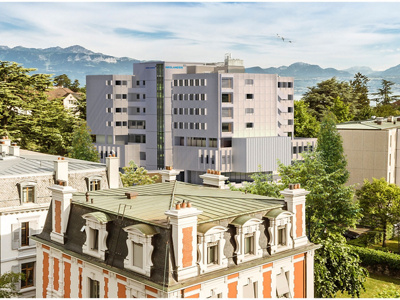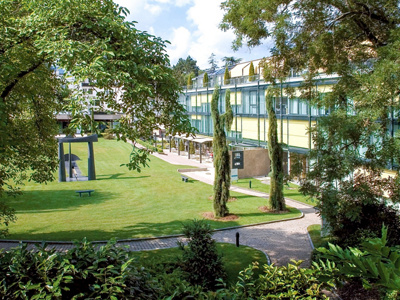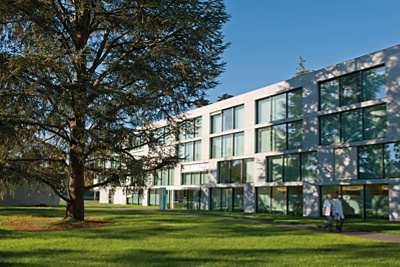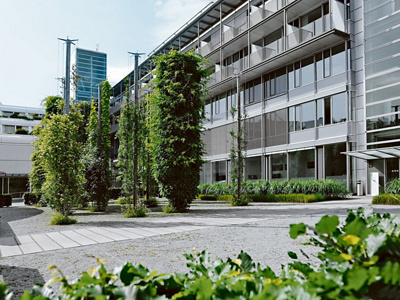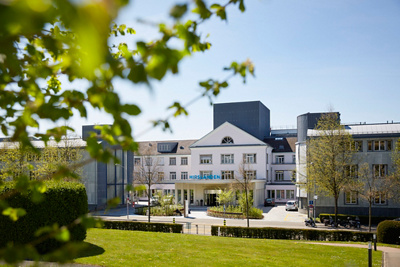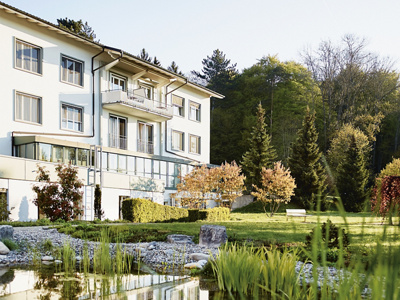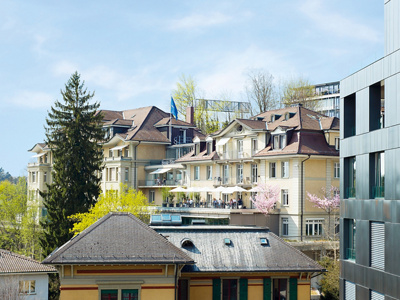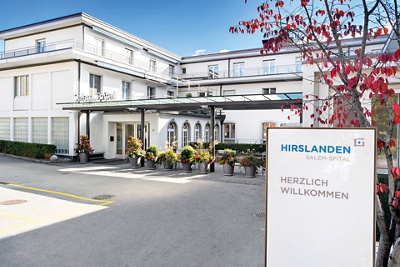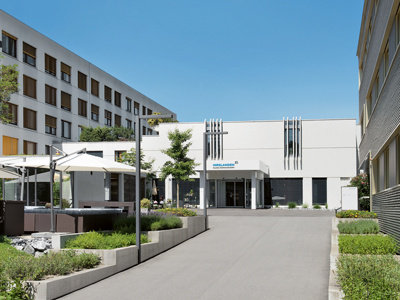The sudden uncertainty triggered by the suspicion of cancer or the painful reality of a cancer diagnosis can turn your life upside down. The experts at our specialist cancer centers are there for you when the world comes to a standstill. Whether in prevention, early detection, treatment or aftercare - we do everything we can to ensure that you feel cared for and comfortable at all times. We offer every patient individual medical care and support tailored to their needs.
Cancer is not a uniform clinical picture, but in all forms there is a mutation of the genetic material in the affected cells. Where these altered cells are located in the body influences the type of symptoms. The warning signs of the different types of cancer therefore differ greatly. Find out more about the development and causes of cancer and the different types of cancer on the following pages.
Breast Cancer Awareness Month & Men's Health
Different types of cancer
Cancer is not a clinical picture in itself; however, mutation of the genetic material in the affected cells occurs in every form of the disease. The location of the cancer cells within the body has a bearing on the type of symptoms that occur. Therefore, the warning signs of the different types of cancer vary significantly. Find out more on the following pages about what causes cancer to develop and about the different types of cancer.
Find out more about the clinical pictures of other types of cancer
Health and prevention
A cancer diagnosis is understandably alarming and even though cancer can now often be effectively treated, it remains a very serious illness. According to the World Health Organisation, a third of all cancers could be prevented if people changed their behaviour and avoided cancer risk factors.
Cancer, in other words the unrestricted growth of malignant tumours, is the result of mutations in the genetic material inside cells. These mutations can be caused by a variety of different factors, including genetically inherited risk factors, the natural ageing process, as well as external influences like lifestyle, harmful substances or infections. Some of these risk factors can be avoided – others can’t. Around a third of all cancers are caused by preventable causes such a smoking, alcohol consumption or an unbalanced diet. The earlier cancer is detected, the greater the chances of a successful treatment.
Cancer screening is divided into primary and secondary preventive measures:
Primary prevention
Primary prevention refers to any measures aimed at preventing the development of cancer. Certain habits are known to promote the development of particular types of cancer. For instance, smoking can lead to lung cancer and excessive alcohol consumption can cause oesophageal cancer.
Secondary prevention
Breast examination: Every woman should examine their own breasts once a month. By doing so, they will become familiar with how their breasts feel and can detect any changes, which should then be investigated by a gynaecologist. More on the topic of breast cancer.
- Pap smear: The cervix is examined annually by a gynaecologist, who carries out what is known as a ‘smear test’. This involves taking a sample of cervical cells, which are then examined for any early signs of cancer.
- Prostate examination: The doctor inserts a finger into the rectum to examine the prostate. A very hard and uneven prostate gland can be a sign of cancer. The examination should ideally be combined with a blood test. More on the topic of prostate cancer.
- Skin examination: It is normal for skin to have spots and moles. However, if they become larger, change in colour or start bleeding, a skin specialist should be consulted. In cases of doubt, unusual changes in the skin are usually surgically removed.
- Colonoscopy: The entire large intestine is checked for polyps, which are non-cancerous growths that can develop into cancer. If any polyps are found, they can be painlessly removed during the examination.
What causes cancer?
Cancer is a collective term which encompasses around 150 different malignant organ tumours and diseases of the lymphohaematopoietic system. After cardiovascular disease, it is the second most common cause of death in Switzerland. However, a cancer diagnosis is not a death sentence as around half of the more than 30,000 new cases every year can be cured.
As long as a cancer remains localised, the treatment success rates are much better than if metastases have already formed. For this reason, early detection and timely treatment are crucial.
Origin
Cancer develops when normal cells change – often during various intermediate steps – into malignant cells that start to divide uncontrollably. When the body’s defence mechanism is not able to destroy them, more and more diseased cells are created to form a localised growth (tumour). The surrounding tissue is subsequently also affected (infiltration). Cancer cells can travel via the lymphatic and circulatory systems to reach other parts of the body, where they then create new cancer growths (metastases). In the case of leukaemia and certain lymphatic cancers, the cancer cells distribute themselves rapidly throughout the entire body.
Benign tumour
Cancer, in other words the unrestricted growth of malignant tumours, is the result of mutations in the genetic material inside cells. These mutations can be caused by a variety of different factors, including genetically inherited risk factors, the natural ageing process, as well as external influences like lifestyle, harmful substances or infections. Some of these risk factors can be avoided – others can’t. Around a third of all cancers are caused by preventable causes such a smoking, alcohol consumption or an unbalanced diet.
Malignant tumour
Malignant tumours are cell growths with altered genetic material. These cells are no longer controlled by the body, so they are characterised by unrestricted growth. As they grow, they infiltrate healthy tissue and destroy it. The cells of a malignant tumour can travel through the bloodstream to reach other parts of the body. There they can form metastases, which can destroy the surrounding tissue.
Diagnosis of cancer
If a doctor suspects a patient may have cancer, comprehensive examinations must be carried out to establish a definite diagnosis. The first signs that may indicate cancer are the symptoms, the patient’s medical history, personal circumstances and lifestyle, as well as the results of the clinical examinations.
Precise diagnosis of the kind of cancer and the tumour’s stage of development is vital for determining the treatment strategy, and makes it possible to estimate the patient’s chances of recovery and life expectancy.
- Blood test (tumour marker)
- Extraction of tissue samples (biopsy, injection)
- Medical imaging such as x-ray imaging (mammography), ultrasound examinations, computed tomography (CT), magnetic resonance imaging (MRI), scintigraphy
- Genetic examinations
The experienced specialists at Hirslanden have access to the latest medical infrastructure, so they can quickly and precisely diagnose cancer on site at the hospital.
Treatment
The treatment of cancer is intended to remove all of the tumour tissue to enable a long-term cure, or to shrink the tumour, reduce tumour-related symptoms and prevent complications. Two or three of the established therapies are often combined in order to destroy not only the actual tumour but also the smallest tumour fragments or individual tumour cells, thereby reducing the risk of a later relapse and improving the chances of recovery.
Outpatient care
Most tumour patients can be treated in an outpatient setting. The Hirslanden Group’s oncological centres feature the latest laboratory and radiology infrastructure, so that outpatient treatments can be performed faster and more efficiently.
In addition to therapy that specifically targets the tumour, great importance is also placed on support services and palliative care. Our specially trained oncological nursing staff know how to meet tumour patients’ specific needs.
Inpatient care
Inpatient stays are necessary for operations and complex therapies, such as extended chemotherapy, high dosage therapies with autologous stem cell transplantation or pain-relieving procedures, as well as for patients who require extensive medical care.
We always take the time to listen. During personal consultations we will enquire about your medical needs, your lifestyle, expectations and wishes, and integrate each of these aspects into your treatment to the best of our ability. After all, the aim of our comprehensive medical care is to maintain or improve your health and overall quality of life.
We will carefully address your individual problems and help you deal with uncertainties regarding the progression of your disease. With our professional support, you can overcome your fears about death and we will also help you manage the emotional distress caused by pain and suffering. If you wish, our chaplains will gladly pay you regular visits.
We would also be happy to incorporate your relatives in our provision of care and assist them during your stay with us. Thanks to our rooming-in system, your relatives can even stay overnight at our hospital.
Therapy options
Surgery
Most tumours are treated surgically. The aim is always to remove the entire tumour. To ensure the cancer has been successfully eradicated, most patients also require chemotherapy or radiotherapy after their operation.
Anti-hormonal therapy
Some types of cancer, such as certain forms of breast or prostate cancer, are related to the body’s metabolism or sex hormones. Medication can be used to suppress the effect of these hormones, which then limits or prohibits the growth of the cancer cells. Anti-hormonal therapy is mostly used after other treatments.
Radiotherapy (radiation therapy)
Tumour cells typically divide quickly and uncontrollably. Radiotherapy inhibits cell division by damaging or even destroying the tumour cells. So it can slow or prohibit the tumour’s growth.
Chemotherapy (medication therapy)
Chemotherapy involves using medication to block or prohibit the growth of cancer cells. A variety of medications are used, depending on the type of cancer and its stage of development.
Haematopoietic stem cell transplantation
If a patient receives a very high dose of chemotherapy, blood stem cells are first collected from the patient's blood using an apheresis machine and stored in liquid nitrogen. After the high-dose chemotherapy, the blood stem cells are returned to the patient as an infusion.
CAR T-cell therapy
Blood can cure cancer: In CAR T-cell therapy, immune cells are genetically modified so that they recognise and fight cancer cells.
Tumorboard
The complexity of providing cancer treatment and comprehensive, individual medical care for every single patient requires collaboration between specialists from various disciplines.
At Hirslanden, regular tumourboard meetings are held to determine the best possible therapy for each patient. Various medical specialists come together once a week at these meetings to discuss treatment options for new or existing tumour patients and plan their therapies.
The tumourboard members include specialists from medical oncology, haematology, radiation oncology, pathology, visceral and thoracic surgery, gynaecology, urology, ENT, neurosurgery, pneumology, gastroenterology, nuclear medicine and diagnostic radiology. Referring doctors are also welcome to attend the meetings.
This is the best way to coordinate comprehensive and individualised therapy for every patient, and to ensure cancer patients benefit from a variety of specialist expertise.
Living with cancer
A cancer diagnosis is always a shock for the patient and their relatives, and can affect all aspects of the person’s life and the lives of those around them. The disease affects their daily routines and can also impact their social life. A temporary absence from work is usually unavoidable. So it is all the more important to try and improve the person’s quality of life wherever possible. Exercise, sport, good nutrition and social contact all play an important role.
Exercise and Sport
If the patient is physically capable, regular exercise and sport can reduce the disease's accompanying symptoms and the side effects of the treatment. Physical activity also alleviates constant fatigue and increases a person’s confidence and lust for life. Sport and exercise have a positive effect on the body’s own defences. Exercising with other cancer patients can provide extra motivation and an important opportunity for social interaction.
Nutrition
Nutrition also has a major influence on well-being and quality of life. Eating the right quantities of different nutrients can aid the cancer therapy and subsequent rehabilitation. A personalised diet can help to counteract any potential loss of appetite, mitigate the side effects of the therapy, strengthen the immune system and promote wound healing. Cancer sometimes makes it necessary for patients to change their eating habits, depending on the type of cancer, how far the disease has progressed and their general state of health. It is worth seeking nutritional advice about the specific needs of cancer patients.
Partnerships
Our partnerships reflect our commitment to the treatment of cancer. By collaborating with various organisations we can access valuable information about research and development, as well as the latest medical findings and requirements – all of which benefits our patients.
Swiss Cancer League (website only available in German, French and Italian)
Oncological rehabilitation
After suffering from cancer, nothing is ever the same again. Oncological rehabilitation therefore includes interdisciplinary measures so that those affected can live their lives as independently as possible despite the illness and exhausting therapy.
The treating surgeon or oncologist will consider rehabilitation if there are severe functional limitations and/or reactions to the chemotherapy or radiotherapy. Other factors in favour of inpatient rehabilitation are malnutrition or malnutrition and a lack of adequate care at home. Artificial nutrition, a newly created artificial anus, drains to drain wound secretions or wound healing disorders are further reasons for inpatient rehabilitation.

We help with every episode in your life
We are your partner for all questions relating to your body's health: if you have any concerns or worries, we are always available for you via the Hirslanden Healthline or the Hirslanden app.



?_ck=2023-09-06T09%3A14%3A24.319Z)


